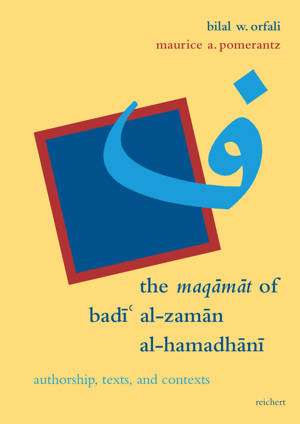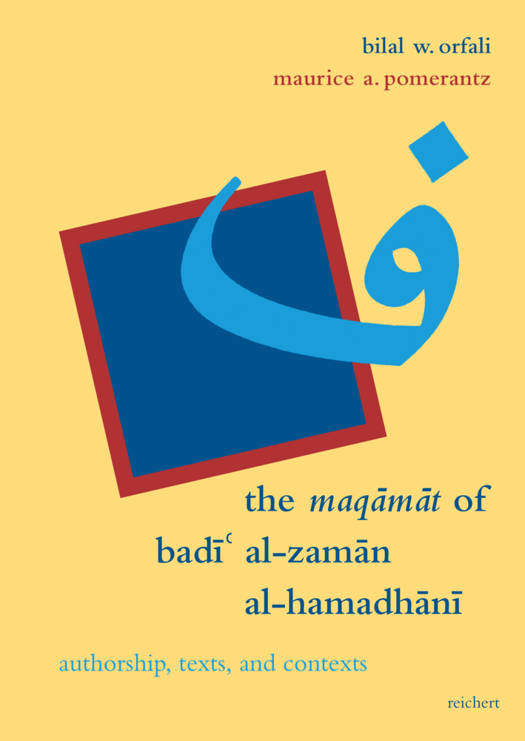
Bedankt voor het vertrouwen het afgelopen jaar! Om jou te bedanken bieden we GRATIS verzending (in België) aan op alles gedurende de hele maand januari.
- Afhalen na 1 uur in een winkel met voorraad
- In januari gratis thuislevering in België
- Ruim aanbod met 7 miljoen producten
Bedankt voor het vertrouwen het afgelopen jaar! Om jou te bedanken bieden we GRATIS verzending (in België) aan op alles gedurende de hele maand januari.
- Afhalen na 1 uur in een winkel met voorraad
- In januari gratis thuislevering in België
- Ruim aanbod met 7 miljoen producten
Zoeken
The Maqamat of Badi' Al-Zaman Al-Hamadhani
Authorship, Texts, and Contexts
Bilal Orfali, Maurice Alex Pomerantz
€ 150,95
+ 301 punten
Omschrijving
Through investigations of the manuscripts, this book explores important aspects of the life of Badi' al-Zaman al-Hamadhani's maqamat. Relying solely on the flawed nineteenth century editions not only compromises the results of modern scholars' investigations of al-Hamadhani's text, but also prevents us from appreciating the literary culture that created this work. The broad concerns of the book are divided into three sections: authorship, texts, and contexts, although there are some overlaps across these fields. One constant is that each chapter in this volume investigates hitherto unstudied textual materials related to al-Hamadhani's Maqamat. Part 1, Authorship, of the book begins with two studies related to al-Hamadhani's authorship. It reviews several theories about al-Hamadhani's reliance on earlier forms in the creation of the maqama, and provide an edited fragment of a lost work by the well-known grammarian Ibn Faris (d. 395/1005). It also describes the way that al-Hamadhani's individual maqamas came to be included in manuscript collections in the years following his death. Part 2, Texts, presents the editions of four maqamas attributed to al-Hamadhani in the manuscript tradition, that were not included in Muhammad 'Abduh's printing: the Tibbiyya, Sharifiyya, Hamadhaniyya, Khatamiyya, along with a discussion and analysis of their contents in relation to the extant corpus of al-Hamadhani's maqamat. Part 3, Contexts, provides studies and translations of key maqamas of al-Hamadhani. "Adab and Metamorphosis: The Mawsiliyya" is an edition, translation, and modern commentary on this maqama in which Abu l-Fath famously attempts to raise a dead man from the grave. This commentary identifies sources from which al-Hamadhani may have drawn, affording modern readers further context with which to explore this tale. "What the Qadi Should not Hear: The Shamiyya" provides the first scholarly edition of this maqama, which ?Abduh excised from the 1889 Beirut printing. The study explores how this maqama draws upon ideas about the limits of proper and improper speech. The last chapter offers a study and edition of a hitherto unknown commentary on the Maqamat of al-Hamadhani that the authors argue may be an example of auto-commentary. The proposed interpretation has profound implications for how the Maqamat of al-Hamadhani were understood by the first generations of readers, including the writers of maqamas who followed him.
Specificaties
Betrokkenen
- Auteur(s):
- Uitgeverij:
Inhoud
- Aantal bladzijden:
- 208
- Taal:
- Engels
- Reeks:
- Reeksnummer:
- nr. 48
Eigenschappen
- Productcode (EAN):
- 9783752000023
- Verschijningsdatum:
- 11/07/2022
- Uitvoering:
- Hardcover
- Formaat:
- Genaaid
- Afmetingen:
- 178 mm x 19 mm
- Gewicht:
- 5207 g

Alleen bij Standaard Boekhandel
+ 301 punten op je klantenkaart van Standaard Boekhandel
Beoordelingen
We publiceren alleen reviews die voldoen aan de voorwaarden voor reviews. Bekijk onze voorwaarden voor reviews.









